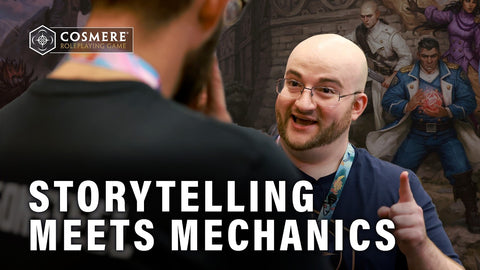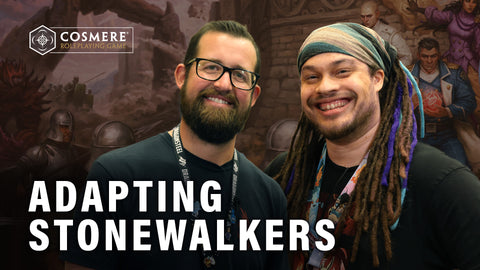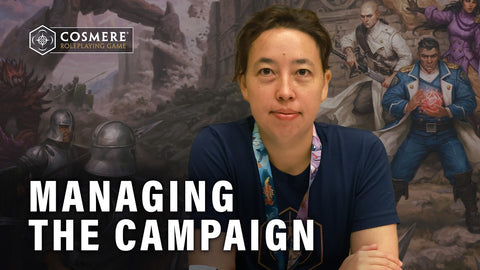The following interview includes paraphrased questions and answers to make it easy to scan through. These are not meant to be taken as direct quotes.
Q: How long have you been with Brotherwise Games, and what brought you to this project?
Ross: I've been with Brotherwise for about a year now, but I’ve been heavily involved in independent game design for years. I’ve created hundreds of subclasses for D&D and been a 5E game master. When the call came to work on this project, I had just finished a year-long reread of the Stormlight Archive. I’m obsessed with Brandon’s magic systems, particularly how they connect, and I specialize in the Surges. Writing an impassioned cover letter for this opportunity felt like the culmination of everything I love.
Q: Who is your favorite character from the Stormlight Archive?
Ross: Kaladin, without a doubt. I relate so much to his struggles. Watching him not only survive but thrive, despite everything he faces, is incredibly inspiring. I cheer for him during his triumphs and feel deep empathy during his lows.
Q: For those unfamiliar, what is 5E, and how does your system compare?
Ross: 5th edition (5E) is a d20-based system where you roll to see if your skill checks succeed. Our system has similar bones but is entirely bespoke. One major difference is our use of the plot die. I was initially skeptical of its power, but it’s an amazing storytelling tool. When you have a risky or narratively important roll, the GM can raise the stakes with the plot die, adding layers of opportunity and failure, which ties beautifully into the winds of fate—a recurring theme in Brandon’s books.
Q: What makes your system different from other TTRPGs like D&D?
Ross: Unlike D&D, which is very combat-focused, we’ve built a system that’s heavily narrative-driven. We have rules for social duels, chases, heists, and mysteries. Our path’s mechanic is closer to Skyrim’s skill trees, allowing you to move between paths and tell your story on Roshar. It’s not just about combat—you experience the full range of character development. While we have some familiar touchpoints, the game is incredibly distinct and designed to make players feel like protagonists in Brandon’s world.
Q: How accessible is the game for new players?
Ross: Very! We’ve had people test it at GenCon who’ve never played a TTRPG before, and they picked up the system in just 15 minutes, even with level 5 characters. We also have a level 0 adventure that lets you design your character during play, which is great for newcomers. For those who want to dive deeper, we’ve developed a full-length campaign with Dan Wells and Brandon Sanderson that takes you from level 1 to level 7.
Q: What influenced your approach to game design for this project?
Ross: I’m a player-focused designer. I wanted to give players the tools to tell their stories. I’m obsessed with Brandon’s magic systems—the Surges, the Knights Radiant—and joining this project was the honor of a lifetime. I approached it with immense passion and a focus on making the system as engaging and flexible as possible for players.
Q: How do you balance gameplay for characters without powers, like those who want to play an ordinary person?
Ross: Our goals and rewards system is key. You can choose goals like rising in the Alethi military, becoming an artist with a patron, or building contacts in the underworld. These paths offer different kinds of power and influence that Radiants might not have. You don’t need world-bending surges to tell a powerful story. For example, you could train a chull to fight alongside you in battle or claim a Shardblade through an honor duel.
Q: What house rules do you expect players to embrace?
Ross: A common house rule is making Bondsmiths playable, which we’ve addressed with a sidebar in the Radiants section. For Skybreakers and Dustbringers, we’ve made it so they don’t get access to all their surges immediately. But we also allow for some flexibility—players can have that moment of extra reward even if they’re missing surges initially.
Q: What excites you most about this game?
Ross: One of my favorite aspects is how we handle advantages. Unlike in D&D, where an advantage only applies to your d20 roll, in our system, you can choose where to apply it—damage, plot die, etc. You can stack advantages too, making for impactful moments. We’ve also integrated words for Ideals that haven’t yet appeared in the books, thanks to Brandon’s input. This Kickstarter is for anyone looking for answers and wanting to embrace those ideals.
Q: What’s an overlooked feature of the game that you want to highlight?
Ross: The conversation and endeavor scene rules are often overlooked but are incredibly powerful storytelling tools. We’ve had players recreate epic moments from the books, like chasing through the thrill or swearing an Ideal to push through challenges. The system encourages players to take canon events and make their own versions, adding layers of depth and narrative freedom.
Q: What was the hardest decision you had to make while designing this game?
Ross: The hardest decision was how to present the Surges. We wanted them to be very freeform, almost acting more like skills than spells. Deciding what should be a core feature versus an upgrade was challenging, but I think people will love the freedom they offer. On the flip side, locking certain powers behind higher Ideals, like transportation, was one of the easiest decisions. It adds a natural progression to the gameplay.
Q: Why do you think Roshar is such a compelling setting for a game?
Ross: Roshar is an alien world with so many secrets and complexities. The war-torn, storm-torn environment, coupled with deific power and rich cultures, makes it incredibly compelling. But what really drives it are the people—the deeply flawed characters and their struggles. Magic isn’t just available to everyone; it’s about self-discovery and bonding with a spren. This world is perfect for a TTRPG because it’s driven by beautifully complex characters and the potential for players to shape the world through their actions.
Q: How does bonding a spren work for players unfamiliar with the Stormlight Archive?
Ross: For those new to the Cosmere, bonding a spren is a magical experience. They get to discover in real-time what it’s like, and that’s what makes it so special. It’s all about self-discovery and growth, just like in the books. That’s the magic of it.




Comments (0)
There are no comments for this article. Be the first one to leave a message!